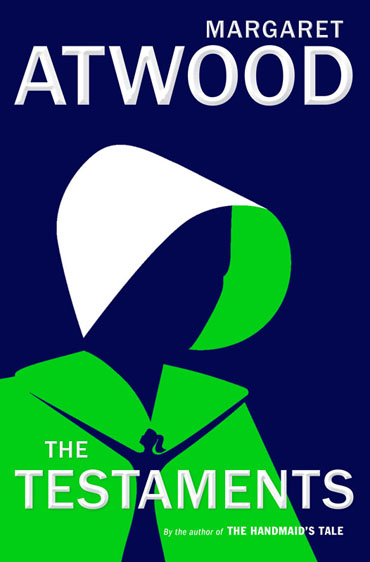-
March 9, 2020
Opening Round
-
Margaret Atwood
1The Testaments
v.
4SaudadeSuneeta Peres da Costa
-
Judged by
Micco Caporale
Let me say up front that, as a general rule, I am against competition. It pits creatives against one another so they’ll vie for an artificial scarcity of money, opportunities, and acclaim. Competition celebrates individual output over considering how works can complement or contrast one another when allowed to coexist. Perhaps more radically, it discourages approaching projects collectively. Fewer royalties for any one person when multiple people have their hands on the pen, right?
I realize coming out as against competition is an odd admission to make as someone who willingly agreed to judge a competition. A competition that challenges accepted conventions of what and who gets celebrated—and rewards this challenge with a rooster! (Someone, please accept the live rooster.) But a competition nonetheless. When I was invited to participate in the Tournament of Books, I thought, “Ahh, what an exciting way to read new novels! I can’t wait to discover the ideas, plots, and turns of phrase I’ll get to bask in—and then flip for cash!” This aging punk is still both a romantic and a scumfuck.
But upon receiving my books, I felt like I’d been invited to express more than my unique tastes. A decision not just about which was “better,” if that could even be objectively determined, but which deserves the cultural space afforded to a “victor.” In one hand, I had Saudade, a new-to-me book by a new-to-me author (Suneeta Peres da Costa) about a young girl’s coming of age in 1960s Portuguese Angola. In the other, I had The Testaments, renowned author Margaret Atwood’s follow-up to The Handmaid’s Tale—a story which now exists as such a mega-franchise, it’s hard to remember its humble literary beginnings.
Coming into Saudade, I knew very little. Not just about the author but about the history and politics girding the book. Even the name required a google search: It’s Portuguese for “a feeling of longing, melancholy, or nostalgia” that’s “essential” to being Portuguese. Interestingly, the book is not about a Portuguese character at all. It’s about an Indian family who moves from Goa to Angola while Angola is under Portuguese occupation, told from the perspective of the daughter.
The novel is short—not even 110 pages—and unfolds in long bodies of text unbroken by paragraphs. Moving quickly, each sentence has to deliver a lot using very little. And it does: The book gives us history. Then there’s this tension between how the family advances colonialism and defends a callous hierarchy while themselves being outsiders. And there’s also a strained relationship between the narrator and her mother—further complicated by domestic violence and patriarchy. We’re also given tiny moments between childhood and adulthood that read like poetry.
Saudade makes actions as simple as looking in the mirror and singing to oneself both meaningful and pleasurable: “My face, belonging to another landscape, one I did not know, gave me the thrill of unexpected discovery and for some moments I moved my mouth, I sang to myself, not in any language that had been taught me, not a lullaby for a messiah but a song of my own improvisation, maybe discordant, but a song more comforting than real words might have offered.” Saudade delivers on two things that make reading exciting to me: experiencing something new or unexpected and reveling in the language that brought me there.
Less new is what The Testaments covers, though it’s got all the lovely passages and observations you’d expect of any Atwood book and certainly its predecessor. Even if you haven’t read The Handmaid’s Tale, you’re likely familiar with it, the feminist piece of speculative fiction about one woman’s life as a forced surrogate in a repressive Christian dystopia called Gilead. While the book is pure imagined nightmare, much of its strength comes from being based on actual things that have happened to women at various points: forced surrogacies and sterilizations, rigid gender and social hierarchies, punitive actions ranging from stockades to stonings. The Handmaid’s Tale forces a new consideration of familiar struggles, rendered with a certain safe emotional distance so often unique to writing.
Contrast this with its television adaptation, where women’s suffering is articulated in excruciating audiovisual detail that’s sold to us as entertainment—but Feminist™! Can we really divorce this story from the larger cultural life it’s living?—from women dressed as handmaids at seemingly any protest advocating for women’s rights to Kylie Jenner’s Handmaid’s Tale birthday party. This is what makes approaching The Testaments without something between skepticism (“Do I really need to know how Gilead fell?”) and cynicism (“Wow, Maggie, you are really milking this cash cow”) difficult.
The Testaments is three women’s explanations of what ruined Gilead. We hear from Aunt Lydia, the woman behind some of the darkest aspects of Gilead. When the men of Gilead outlaw things like women reading, Aunt Lydia is the lady who steps in and says, “It’s for your own good, girls!”—and doles out excruciating punishments to those who disobey. We also hear from Agnes, a woman born and raised in Gilead, and Daisy, a woman raised in Canada who—SPOILER!—is actually Baby Nicole, who was smuggled out of Gilead by her mother, a handmaid. (I say “spoiler,” but you suspect this as soon as Daisy mentions Baby Nicole in Daisy’s first chapter, and it’s confirmed very early in the book.) The Testaments is more plotty and less meditative than The Handmaid’s Tale. A thriller from someone whose literary strengths were never thrills.
To that end, The Handmaid’s Tale was published in the 1980s, when the political climate, the feminist conversation, and the surveillance state were, well, different. Simpler. Having less to flesh out works to that book’s advantage. Unfortunately, returning to the same story nearly 30 years later and attempting to render those complexities into a satisfying roadmap out of Gilead proves clumsy at best. There is lots of source material on how women have suffered over the ages, little on how they’ve overcome it that would speak to intersectional late-capitalist concerns, and even less on successful revolutions in developed countries. Even approaching The Testaments with an open mind, the book’s scope is quite ambitious. Much of its writing feels fatigued.
Take the explanation for names adopted by Aunts, the designated unmarried women of Gilead who oversee All Things Female. Eligible names come from “products women had liked once and would be reassured by.” Except, as Agnes points out, “Nobody our age knew [what they were].” So when one character is debating what name to take as an Aunt, Agnes suggests Aunt Maybelline. In The Handmaid’s Tale, the “of” plus “man’s name” convention that gave us names like “Offred” and “Ofkyle” told us something about how handmaids are commodified in Gilead, their identities subsumed by the men raping them. But in The Testaments, I can’t tell what this naming convention is telling me about the Aunts. Would anyone sincerely believe “Aunt Lipstick” is disarming? Then later, it’s like this detail doesn’t even matter. Aunt Lydia refers to someone as “Aunt Something”—because she “just can’t remember nurses’ names?” Clocking in at just over 400 pages, I would have gladly taken half.
So there I had it: two first-person books about women processing complex sociopolitical experiences. One, smart historical fiction by an author of color who is decorated with higher-brow accomplishments like a Fulbright scholarship and lots of prizes with the word “literary” in them. (Thank you, Wikipedia!) The other, breezy speculative fiction by a white woman whose robust output has been translated, adapted, and anthologized beyond most authors’ wildest imaginations.
I feel sad that I knew so much about Atwood and The Testaments before even reading it, yet I’d never heard of Peres da Costa or Saudade—which probably says as much about the circles I run in as it does about what’s allowed to exist in multiple spheres. Saudade felt challenging without being daunting, and the language was lovely. You don’t have to read up on, say, Angolan history to connect with it—though you’ll get more from the book if you do. Contrast that with The Testaments, which is probably everything you’d expect from a book with a fanbase that likes watching women get tortured on TV.
In many ways, the high visibility of The Testaments has already marked it as a “victor,” but in this contest, I pick Saudade, which better spoke to my personal tastes—but independent of that, I just want more stories that aren’t as tidy or easy to explain as The Testaments. Tales that don’t assume readers need their hand held on every line. Books that suggest we can be trusted with layered narratives and that push us to dig deeper, but don’t hold us back if we don’t. (I’m sure there was much about Saudade that went over my head, but I still connected with a lot of it.) As in politics, I want more cultural space for reads that aren’t as easy to pin down.
Match Commentary
By Kevin Guilfoile & John Warner
Kevin Guilfoile: Film and television adaptations have a way of overwhelming their source material. A film or TV show, even one based on a very popular novel, often becomes the definitive version. That isn’t always a bad thing for readers and viewers. Blade Runner is a better work of art than Do Androids Dream of Electric Sheep? Coppola’s Godfather is better than Puzo’s. Nevertheless, authors sometimes have a strained relationship with their screenwritten stepchildren. The TV characters don’t have the novelist’s DNA in the same way the originals do.
When I started reading The Testaments, I wondered if this was Atwood’s attempt to reclaim Gilead for the kingdom of words, or at least to get ahead of the excellent Hulu adaptation of The Handmaid’s Tale (the TV narrative has moved beyond the original novel; The Testaments skips even further ahead). There are moments where Atwood seems to be reasserting her ownership of the text—she gives Aunt Lydia a different, or at least expanded, backstory from the TV show, for instance—and as I read I was cheering it. For the first 300 pages or so, it was everything I could have wanted from The Handmaid’s Tale sequel. It got inside the head of one of the original novel’s best characters and villains, and probed the world of Gilead (and the world just outside it) beyond the original book. Whether The Testaments will have the enduring relevance of The Handmaid’s Tale remains to be seen, but it certainly has a shrewd eye on current American politics. “God isn’t what they say,” one character confesses. “You can believe in Gilead or you can believe in God, but not both.” That has echoes of Dostoevsky’s evisceration of 19th-century Catholicism, but it’s also a decent impersonation of the little voice that keeps Mike Pence up at night.
Judge Caporale says that Atwood seems to trip over the thriller plot, and that’s hard to argue with. The last 100 pages string together a number of too-convenient events, and the peril facing the main characters never seems overly perilous. The buildup seemed to call for a little more adventure. Still I enjoyed the hell out of it.
John Warner: Here is where in our Siskel and Ebert act, I turn to you and look dumbfounded and say something like, Roger, you couldn’t be more wrong about this movie…I mean book.
Kevin: This is actually kind of exciting. While we often have differences in degree, one of the reasons we became friends some 20-plus years ago is that when it comes to books (and movies and music and politics) you and I together are something like a wind-up confirmation-bias generator. So please, go on!
John: Look, I am a certified Margaret Atwood fan, have read at least a half dozen of her books, taught her novels in class and have watched that video of her zipping along on an electric scooter a couple dozen times, but for me, The Testaments was not good.
I’ll say worse than not good, as in bad, as in after awhile I thought I was reading Handmaid’s Tale fan fiction. There was no narrative tension for me, the prose couldn’t have been flatter, and there were scenes where I was sure that I’d skipped a page because I couldn’t believe she’d exited on the moment I just read.
My disappointment is probably outsized due to my hopes for the novel. I was actually a little wary, but once it co-won the Booker, I was like, it must be good, but I don’t know man, it’s a thumbs down for me.
Kevin: Perhaps it was the setting or my mood or that I too am an Atwood fan, but reading The Testaments felt very comfortable for me. And maybe that’s not a great thing for a novel like this. If I were thinking more critically, maybe I’d expect a dystopian novel that addresses head on what I believe to be real and immediate threats to our personal freedoms should do more to make me uncomfortable. What can I say? I liked it.
In the other column is Saudade. True story: I downloaded and read Saudade in its entirety while waiting for an auto mechanic to fix my passenger-side windshield wiper. This is not meant as a slight—I’ve published a book about the same length. In fact, Saudade is all Judge Caporale says it is, and it might even succeed on its own terms better than The Testaments does.
John: It does.
Kevin: But The Testaments does more of the simple things that I most enjoy in a novel. It returned me to a fascinating place. It engaged me with characters who took interesting journeys. It sustained me as a reader in ways Saudade, for all its admittedly immersive style, could not.
This is probably going to become a theme for me this year: Particularly as I get older, I find there are simply certain kinds of stories that I would rather be reading. The Testaments is one.
John: Saudade felt like it was over before I’d even settled in, but there’s some arresting moments in the story, a simmering darkness that worked its way inside me. The Testaments only engendered irritation.
Kevin: Tomorrow you and I are in the booth for a third straight day as Helen Rosner takes on Normal People by Sally Rooney and Fleishman Is in Trouble by Taffy Brodesser-Akner.
Spoiler: I liked both of these books a lot, John. I’m very curious which way Judge Rosner will lean.
New 2020 Tournament of Books merch is now available at the TMN Store. As a reminder, Sustaining Members receive 50 percent off everything in our store. To find out why we’re asking for your support and how you can become a Sustaining Member, please visit our Membership page. Thank you.
Welcome to the Commentariat
Population: You
To keep our comments section as inclusive as possible for the book-loving public, please follow the guidelines below. We reserve the right to delete inappropriate or abusive comments, such as ad hominem attacks. We ban users who repeatedly post inappropriate comments.
- Criticize ideas, not people. Divisiveness can be a result of debates over things we truly care about; err on the side of being generous. Let’s talk and debate and gnash our book-chewing teeth with love and respect for the Rooster community, judges, authors, commentators, and commenters alike.
- If you’re uninterested in a line of discussion from an individual user, you can privately block them within Disqus to hide their comments (though they’ll still see your posts).
- While it’s not required, you can use the Disqus
tag to hide book details that may spoil the reading experience for others, e.g., “ Dumbledore dies .” - We all feel passionately about fiction, but “you’re an idiot if you loved/hated this book that I hated/loved” isn't an argument—it’s just rude. Take a breath.



